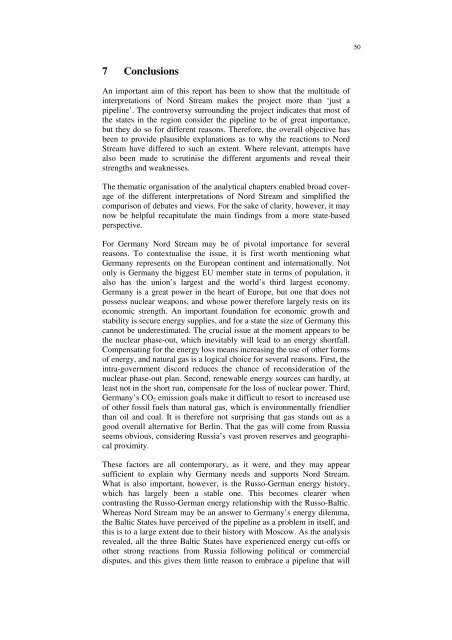Nord Stream: Not Just a Pipeline
Nord Stream: Not Just a Pipeline
Nord Stream: Not Just a Pipeline
Create successful ePaper yourself
Turn your PDF publications into a flip-book with our unique Google optimized e-Paper software.
7 Conclusions<br />
An important aim of this report has been to show that the multitude of<br />
interpretations of <strong>Nord</strong> <strong>Stream</strong> makes the project more than ‘just a<br />
pipeline’. The controversy surrounding the project indicates that most of<br />
the states in the region consider the pipeline to be of great importance,<br />
but they do so for different reasons. Therefore, the overall objective has<br />
been to provide plausible explanations as to why the reactions to <strong>Nord</strong><br />
<strong>Stream</strong> have differed to such an extent. Where relevant, attempts have<br />
also been made to scrutinise the different arguments and reveal their<br />
strengths and weaknesses.<br />
The thematic organisation of the analytical chapters enabled broad coverage<br />
of the different interpretations of <strong>Nord</strong> <strong>Stream</strong> and simplified the<br />
comparison of debates and views. For the sake of clarity, however, it may<br />
now be helpful recapitulate the main findings from a more state-based<br />
perspective.<br />
For Germany <strong>Nord</strong> <strong>Stream</strong> may be of pivotal importance for several<br />
reasons. To contextualise the issue, it is first worth mentioning what<br />
Germany represents on the European continent and internationally. <strong>Not</strong><br />
only is Germany the biggest EU member state in terms of population, it<br />
also has the union’s largest and the world’s third largest economy.<br />
Germany is a great power in the heart of Europe, but one that does not<br />
possess nuclear weapons, and whose power therefore largely rests on its<br />
economic strength. An important foundation for economic growth and<br />
stability is secure energy supplies, and for a state the size of Germany this<br />
cannot be underestimated. The crucial issue at the moment appears to be<br />
the nuclear phase-out, which inevitably will lead to an energy shortfall.<br />
Compensating for the energy loss means increasing the use of other forms<br />
of energy, and natural gas is a logical choice for several reasons. First, the<br />
intra-government discord reduces the chance of reconsideration of the<br />
nuclear phase-out plan. Second, renewable energy sources can hardly, at<br />
least not in the short run, compensate for the loss of nuclear power. Third,<br />
Germany’s CO2 emission goals make it difficult to resort to increased use<br />
of other fossil fuels than natural gas, which is environmentally friendlier<br />
than oil and coal. It is therefore not surprising that gas stands out as a<br />
good overall alternative for Berlin. That the gas will come from Russia<br />
seems obvious, considering Russia’s vast proven reserves and geographical<br />
proximity.<br />
These factors are all contemporary, as it were, and they may appear<br />
sufficient to explain why Germany needs and supports <strong>Nord</strong> <strong>Stream</strong>.<br />
What is also important, however, is the Russo-German energy history,<br />
which has largely been a stable one. This becomes clearer when<br />
contrasting the Russo-German energy relationship with the Russo-Baltic.<br />
Whereas <strong>Nord</strong> <strong>Stream</strong> may be an answer to Germany’s energy dilemma,<br />
the Baltic States have perceived of the pipeline as a problem in itself, and<br />
this is to a large extent due to their history with Moscow. As the analysis<br />
revealed, all the three Baltic States have experienced energy cut-offs or<br />
other strong reactions from Russia following political or commercial<br />
disputes, and this gives them little reason to embrace a pipeline that will<br />
50













